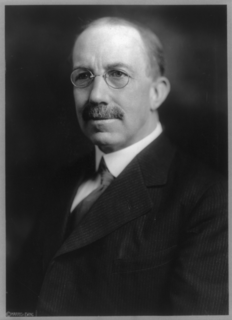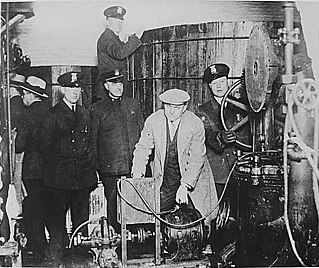Related Research Articles

Prohibition is the act or practice of forbidding something by law; more particularly the term refers to the banning of the manufacture, storage, transportation, sale, possession, and consumption of alcoholic beverages. The word is also used to refer to a period of time during which such bans are enforced.

The Eighteenth Amendment of the United States Constitution established the prohibition of alcohol in the United States. The amendment was proposed by Congress on December 18, 1917, and was ratified by the requisite number of states on January 16, 1919. The Eighteenth Amendment was repealed by the Twenty-first Amendment on December 5, 1933. It is the only amendment to be repealed.

The National Prohibition Act, known informally as the Volstead Act, was enacted to carry out the intent of the 18th Amendment, which established prohibition in the United States. The Anti-Saloon League's Wayne Wheeler conceived and drafted the bill, which was named for Andrew Volstead, Chairman of the House Judiciary Committee, who managed the legislation.

The Twenty-first Amendment to the United States Constitution repealed the Eighteenth Amendment to the United States Constitution, which had mandated nationwide prohibition on alcohol. The Twenty-first Amendment was proposed by the 72nd Congress on February 20, 1933, and was ratified by the requisite number of states on December 5, 1933. It is unique among the 27 amendments of the U.S. Constitution for being the only one to repeal a prior amendment, as well as being the only amendment to have been ratified by state ratifying conventions.

The Blaine Act, formally titled Joint Resolution Proposing the Twenty-First Amendment to the United States Constitution, is a joint resolution adopted by the United States Congress on February 20, 1933, initiating repeal of the 18th Amendment to the United States Constitution, which established Prohibition in the United States. Repeal was finalized when the 21st Amendment to the Constitution was ratified by the required minimum number of states on December 5, 1933.

The Oregon Liquor Control Commission (OLCC) is a government agency of the U.S. state of Oregon. The OLCC was created by an act of the Oregon Legislative Assembly in 1933, days after the repeal of prohibition, as a means of providing control over the distribution, sales and consumption of alcoholic beverages. To this end, the agency was given the authority to regulate and license those who manufacture, sell or serve alcohol. Oregon is one of 18 alcoholic beverage control states that directly control the sales of alcoholic beverages in the United States. In 2014, the passage of Oregon Ballot Measure 91 (2014) legalized the recreational use of marijuana in Oregon and gave regulatory authority to the OLCC.
Alcoholic beverage control states, generally called control states, are 17 states in the United States that, as of 2016, have state monopoly over the wholesaling or retailing of some or all categories of alcoholic beverages, such as beer, wine, and distilled spirits.
A liquor license is a governmentally issued permit to sell, manufacture, store, or otherwise use alcoholic beverages.

Wayne Bidwell Wheeler was an American attorney and longtime leader of the Anti-Saloon League. The leading advocate of the prohibitionist movement in the late 1800s and early 1900s, he played a major role in the passage of the Eighteenth Amendment to the United States Constitution, which outlawed the manufacture, distribution, and sale of alcoholic beverages.

The Delaware Division of Alcohol and Tobacco Enforcement (DATE) is a law enforcement agency of the State of Delaware and is a division of the Delaware Department of Safety and Homeland Security (DSHS).

The alcohol laws of Kansas are among the strictest in the United States, in sharp contrast to its neighboring state of Missouri, and similar to its other neighboring state of Oklahoma. Legislation is enforced by the Kansas Division of Alcoholic Beverage Control.

The U.S. state of Oregon has an extensive history of laws regulating the sale and consumption of alcoholic beverages, dating back to 1844. It has been an alcoholic beverage control state, with the Oregon Liquor Control Commission holding a monopoly over the sale of all distilled beverages, since Prohibition. Today, there are thriving industries producing beer, wine, and liquor in the state. Alcohol may be purchased between 7 a.m. and 2:30 a.m. As of 2007, consumption of spirits is on the rise, while beer consumption is holding steady. Also, 11% of beer sold in Oregon was brewed in-state, the highest figure in the United States.

Prohibition in the United States was a nationwide constitutional ban on the production, importation, transportation, and sale of alcoholic beverages from 1920 to 1933.

Alcohol laws are laws in relation to the manufacture, use, being under the influence of and sale of alcohol or alcoholic beverages that contains ethanol. Common alcoholic beverages include beer, wine, cider, and distilled spirits. The United States defines an alcoholic beverage as, "any beverage in liquid form which contains not less than one-half of one percent of alcohol by volume", but this definition varies internationally. These laws can restrict those who can produce alcohol, those who can buy it, when one can buy it, labelling and advertising, the types of alcoholic beverage that can be sold, where one can consume it, what activities are prohibited while intoxicated, and where one can buy it. In some cases, laws have even prohibited the use and sale of alcohol entirely, as with Prohibition in the United States from 1920 to 1933.
A dry state was a state in the United States in which the manufacture, distribution, importation, and sale of alcoholic beverages was prohibited or tightly restricted. Some states, such as North Dakota, entered the United States as dry states, and others went dry after the passage of prohibition legislation, the Volstead Act. No state remains completely dry, but some states do contain dry counties.

The Temperance movement in the United States is a movement to curb the consumption of alcohol. It had a large influence on American politics and American society in the nineteenth and twentieth centuries, culminating in the unsuccessful prohibition of alcohol, through the Eighteenth Amendment to the United States Constitution, from 1920 to 1933. Today, there are organizations that continue to promote the cause of temperance.
Lambert v. Yellowley, 272 U.S. 581 (1926), was a decision by the Supreme Court of the United States that reaffirmed the National Prohibition Act's limitation on the dispensation of alcoholic medicines. The five-to-four decision, written by Justice Louis D. Brandeis, affirmed the dismissal of a suit in which New York City physician Samuel Lambert sought to prevent Edward Yellowley, the acting federal prohibition director, from enforcing the Prohibition Act so as to preclude him from prescribing alcoholic medicines. The decision affirmed the police powers of the individual states, as well as the power of the Necessary and Proper Clause of the United States Constitution, which was cited in upholding the Prohibition Act's limitations as a necessary and proper implementation of the Eighteenth Amendment to the United States Constitution.

The Michigan Liquor Control Commission is an agency of the U.S. state of Michigan, within the Michigan Department of Licensing and Regulatory Affairs (LARA), responsible for regulating the sale and distribution of liquor in the state.

Medicinal Liquor Prescriptions Act of 1933 is a United States federal statute establishing prescription limitations for physicians possessing a permit to dispense medicinal liquor. The public law seek to abolish the use of the medicinal liquor prescription form introducing medicinal liquor revenue stamps as a substitution for official prescription blanks.
References
- 1 2 Walter Stubbs (1985), Congressional Committees, 1789-1982: A Checklist, Greenwood Press, p. 5
- ↑ "A Fair Division Wanted" (PDF). New York Times. March 22, 1890. Retrieved 2009-02-22.
- ↑ Committee on Alcoholic Liquor Traffic (1925). Survey of Alcoholic Liquor Traffic and the Enforcement of the Eighteenth Amendment. Government Printing Office. Retrieved 2009-02-21.
- ↑ Schamel, Charles E.; Mary Rephlo; Rodney Ross; David Kepley; Robert W. Coren; James Gregory Bradsher (1989). "Guide to the Records of the United States House of Representatives at the National Archives, 1789-1989: Bicentennial Edition". National Archives and Records Administration. pp. Chapter 14. Retrieved 2009-02-13.
- ↑ United States Congress (1893). Official Congressional Directory. 52nd Congress, 2nd Session (2nd ed.). Government Printing Office. p. 134. OCLC 457274180 . Retrieved 2009-02-21.
| | This United States Congress–related article is a stub. You can help Wikipedia by expanding it. |